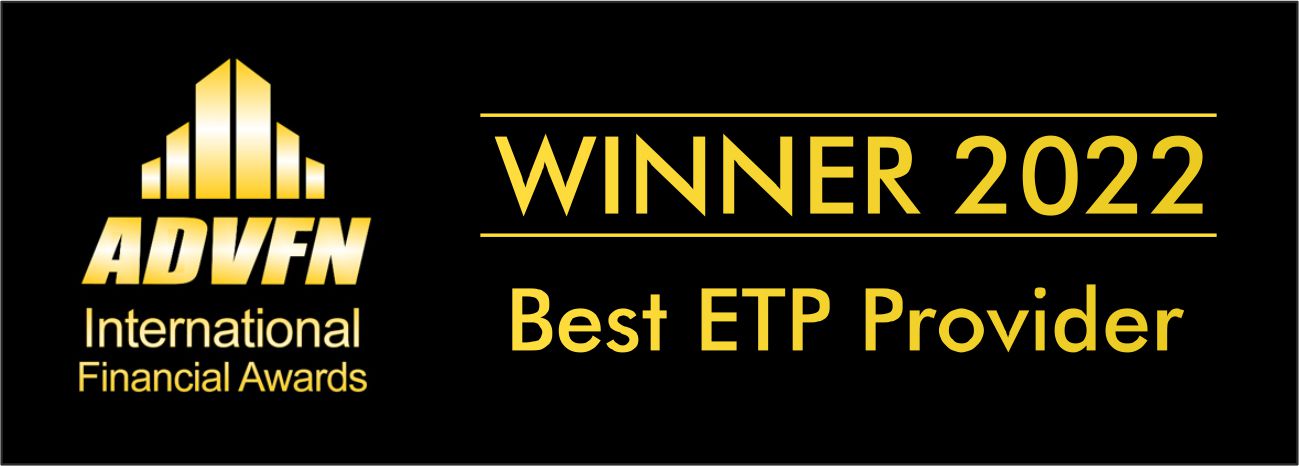How to Invest in FTSE 100 in the United Kingdom
Posted:
Introduction
In this article, we focus on investing in the FTSE 100, the UK index of blue chip stocks, by providing you with information about what it is, how to invest in it, the risks and the benefits, and also ways that sophisticated investors can act tactically around stocks in the index.
GraniteShares is focused on delivering innovative and cutting edge investment solutions for sophisticated investors.
Related: Get to know us
What is FTSE 100?
The FTSE 100 is a stock market index comprising the 100 largest companies listed on the London Stock Exchange, which are weighted by their size as reflected by market capitalisation. The index includes household names like AstraZeneca, Barclays, BP, Rio Tinto, Tesco and Vodafone. Historically, many of the constituents have been particularly attractive holdings for investors because of the dividends that they pay out. This remains the case, however many companies have cut or reduced their dividends in 2020 as a result of the global coronavirus pandemic. As of 31 August 2020, the reported dividend yield on the FTSE 100 was 4.7%.
What are indices?
Stock market indices, which are made of individual stocks, are used by investors to measure performance and serve as ‘benchmarks’ that professional fund managers try to beat. The FTSE 100 was created in 1984 as a joint venture between the Financial Times and the London Stock Exchange, today the index is owned by FTSE Russell, which is part of the London Stock Exchange Group
The FTSE 100 is one of best known and widely followed stock market indices in Europe. You can see FTSE 100 current level here.
Together with the FTSE 250, it serves as a bellwether for the UK market and economy, in a similar way the S&P 500 or Dow Jones indexes in the United States.
How to Invest in the FTSE 100
An exchange-traded fund (ETF) makes it simple for investors to obtain exposure to the index. Rather than buying each share individually, an investor can track the index simply by buying shares in the ETF, which is considerably cheaper than buying all the constituents individually. An ETF tracking the FTSE 100 will deliver the performance of the FTSE 100 index less any applicable fees.
ETFs are a low-cost investment solution that are attractive for those investors who want the flexibility to be able to buy and sell through the trading day,. ETFs were first listed on London Stock Exchange in 2000, and, in August 2020, there were over 1250 ETFs listed that track indices consisting of either equities, bonds or commodities.
To obtain exposure to the FTSE 100 through an ETF listed on London Stock Exchange, investors have choice between a number of product providers. These include: Amundi, HSBC, iShares, Lyxor, UBS, Vanguard, Xtrackers
| Fund name | ISIN | Ticker |
|---|---|---|
|
Amundi ETF FTSE 100 UCITS ETF GBP |
LU1437025296 |
FT1K |
|
HSBC FTSE 100 UCITS ETF GBP |
IE00B42TW061 |
HUKX |
|
Invesco FTSE 100 UCITS ETF |
IE00B60SWT88 |
S100 |
|
iShares Core FTSE 100 UCITS ETF (Dist) |
IE0005042456 |
ISF |
|
iShares Core FTSE 100 UCITS ETF GBP (Acc) |
IE00B53HP851 |
CUKX |
|
Lyxor FTSE 100 UCITS ETF - Acc |
LU1650492173 |
L100 |
|
Lyxor FTSE 100 UCITS ETF - Dist |
LU1650492256 |
100D |
|
UBS ETF (LU) FTSE 100 UCITS ETF (GBP) A-dis |
LU0136242590 |
UB03 |
|
Vanguard FTSE 100 UCITS ETF (GBP) Accumulating |
IE00BFMXYP42 |
VUKG |
|
Vanguard FTSE 100 UCITS ETF Distributing |
IE00B810Q511 |
|
|
Xtrackers FTSE 100 UCITS ETF 1C |
LU0838780707 |
XDUK |
|
Xtrackers FTSE 100 UCITS ETF Income 1D |
LU0292097234 |
XUKX |
Investors should always consider expense ratios when investing in ETFs since they can eat into returns over the long run and they should also look at how closely the ETF tracks the index over time. For ETFs tracking the FTSE 100, the tracking difference should be minimal, although it might increase a little if there have been sustained periods of high volatility.
The ETFs can be purchased through execution-only investment platforms as well as through advisory stockbrokers and wealth managers. They can be held in standard investment accounts as well as self-select ISAs and SIPPs.
Investment Risks of the FTSE 100
The investment risks the FTSE 100 relate to specific sectors and companies that make up the index as well as the geographic and currency exposure of each company. The companies in the FTSE 100 range from those that have almost 100% UK exposure like Lloyds Banking Group to those like AstraZeneca, HSBC, and Royal Dutch Shell that operate in countries across the globe. Each company will be subject to localised economic, market, political or regulatory events. The value of equities and equity-related securities will both shape and be driven by daily stock market movements, with factors such as political, economic news, company earnings, significant corporate events, as well as general investor sentiment
Old Economy vs New Economy
One of the features of the FTSE 100 is that it well-diversified across a number of industry sectors, some of which are considered defensive like pharmaceuticals and food retailers, while sectors such as mining and oil and gas are more geared to the business cycle. What is noticeable is that there are very few technology stocks in the FTSE 100 and therefore it is viewed very much as an Old Economy index in contrast to the major US indices, which are now dominated by big technology stocks and therefore more representative of the New Economy.
Labelling the FTSE 100 as an Old Economy index is in one sense a gross simplification because some of the companies in the FTSE 100 are at the cutting edge of technological developments, e.g. Vodafone and 5G, Rolls-Royce and battery storage, BAE Systems and cybersecurity, or are in the process of evolving their business models, e.g. BP and Royal Dutch Shell transitioning to energy service companies. At the same time, mining companies like Glencore and Rio Tinto provide the raw materials that are core to the development of electric vehicles.
GraniteShares and the FTSE 100
GraniteShares does not offer exposure to the FTSE 100, however it does give sophisticated investors exposure to eleven FTSE 100 companies through its short and leveraged single stock Exchange Traded Products (ETPs). The eleven companies are: AstraZeneca, BAE Systems, Barclays, BP, Diageo, Glencore, Lloyds Banking Group, Rio Tinto, Rolls-Royce Holdings, Royal Dutch Shell, and Vodafone.
These ETPs can be used in a number of ways by investors with exposure to FTSE 100, including the implementation of:
- Portfolio tilts by going overweight / underweight stocks in the index
- Hedges to mitigate stock specific risk in the index or a proxy for broad market risk
You can find out more about these ETPs by clicking here.
Related: Weekly Research from our company
Conclusion
We hope that this has been a helpful introduction to the FTSE 100, which directly or indirectly will be a core holding for many UK investors, and, because of the global reach of many of the companies in the index, a benchmark that is followed closely by international investors. As discussed, it is seen as an Old Economy index, but many of its constituents are leaders in their fields. Its mix of defensive and cyclical companies provide exposure to both the UK and global economy. For sophisticated investors, GraniteShares range of single stock ETPs provide the opportunity to implement hedging and other strategies around the FTSE 100.
To read the FTSE Russell brochure on History and Heritage of the FTSE UK Index Series, please click here
Are you a sophisticated investor looking for alternative investment solutions? GraniteShares short and leveraged single stock ETPs could be exactly what you’ve been looking for!
DISCLAIMER
GraniteShares accepts no responsibility for any loss or damage resulting directly or indirectly from the use of this blog or the contents. GraniteShares Limited (“GraniteShares”) (FRN: 798443) is an appointed representative of Messels Limited which is authorised and regulated by the Financial Conduct Authority.
This blog does not constitute an offer to buy or sell or a solicitation of an offer to buy securities in any company. Nothing contained herein constitutes investment, legal, tax or other advice nor is to be relied upon in making an investment or other decision. No recommendation is made positive or otherwise, regarding individual securities or investments mentioned herein. Any summary list of risk factors does not purport to be a complete enumeration or explanation of the risks involved in a particular investment. Prospective clients must consult with their own legal, tax and financial advisers before deciding to invest. This email contains the opinions of the author and such opinions are subject to change without notice. The source of data is GraniteShares unless otherwise stated. No guarantee is made to the accuracy of the information provided which has been obtained from sources believed to be reliable. This email and the information contained herein is intended only for the use of persons (or entities they represent) to whom it has been provided. Past performance is not a reliable indicator of future results. The value of an investment may go down as well as up and can result in losses, up to and including a total loss of the amount initially invested. Investments may involve numerous risks including, among others, company risks, general market risks, credit risks, foreign exchange risks, interest rate risks, geopolitical risks and liquidity risks. Please note that GraniteShares short and leveraged Exchange Traded Products are for sophisticated investors.


